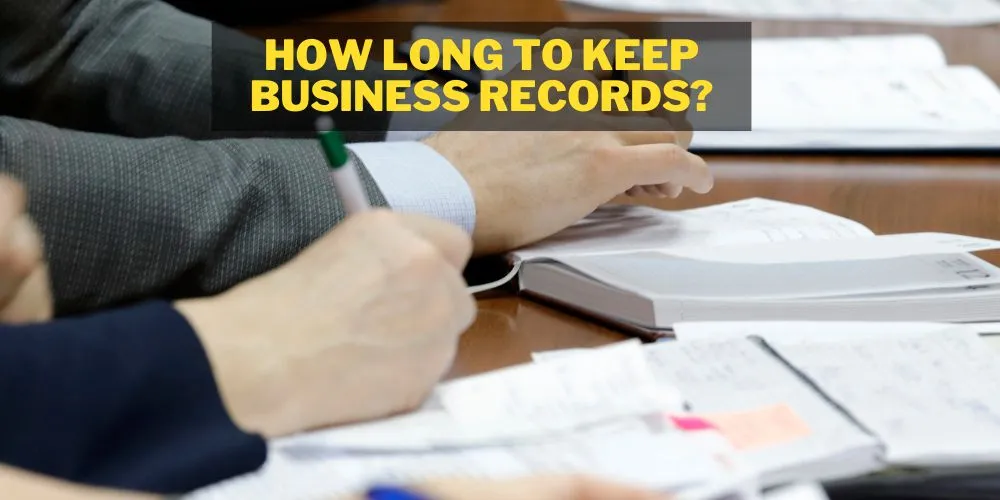Keeping business records is a practice that supports a company’s legal, fiscal, and operational frameworks.
Given that these documents back financial accuracy and legal compliance, knowing how long to keep business records is critical for any business’s efficiency and accountability.
Importance of Record Keeping in Business
Legal Compliance
Adherence to the law is a significant driver for record retention. Various regulations require businesses to store documents for specific periods.
For instance, tax authorities require companies to keep records that support tax entries, deductions, and credits for a period determined by the statute of limitations for tax assessments. Failing to keep these records might result in penalties or legal issues.

Financial Accuracy
Accurate and accessible records form the bedrock of financial integrity. They enable businesses to track growth, understand financial standings, and make informed economic decisions. They provide the essential data for preparing financial statements and tax returns and help in monitoring expenses and cash flow.
Operational Efficiency
Organized records facilitate smoother daily operations, strategic planning, and resource management. They support quality management processes and service delivery, contributing to overall business performance and compliance with industry standards.
Types of Business Records to Keep
Financial Records
Financial documents such as invoices, receipts, payroll data, and tax filings form the core of retained documents. They serve as proof of transactions and are essential for auditing and tax purposes.
Legal Documents
This category includes incorporation documents, licenses, contracts, and insurance policies. These documents are crucial for proving legal compliance, defining rights and obligations, and safeguarding intellectual property, among other legal functions.
Employee Records
Keeping comprehensive employee records, including recruitment details, payroll, and performance evaluations, helps in human resource management and is crucial for compliance with labor laws.
Operational Records
Records like meeting minutes and project reports provide insights into business operations and strategic decisions, which are helpful for audits and strategic reviews.
How Long To Keep Business Records?
Financial Records
Generally, it is advisable to keep financial records for a minimum of seven years, as this covers the period that tax authorities may initiate an audit. However, some items like asset records should be kept longer for accounting purposes.
Legal Documents
The retention period for legal documents varies. For example, contracts should be retained for at least a few years beyond the term of the agreement to handle any potential disputes.
In contrast, permanent records such as incorporation papers should be kept indefinitely.
Employee Records
Employee records should be kept for at least seven years following termination, considering various labor and employment laws. This duration supports potential audits and legal claims that could occur post-employment.
Operational Records
Operational records such as minutes of meetings should typically be kept for at least three years, as they provide historical insights into business decisions and operational strategies.
Digital vs. Physical Record Keeping
Digital record-keeping offers benefits such as accessibility, efficient storage, and security when managed correctly.
However, it also requires robust cybersecurity measures to prevent data breaches. Physical records, while bulky and harder to manage, provide a tangible backup that is not prone to digital threats.

A hybrid approach, maintaining both digital and physical copies, is often practiced for critical documents.
Pro Tips for Efficient Record Keeping
Establish a Record Retention Policy
Creating a formal policy that defines how long different types of records should be retained and who is responsible for them is crucial. This policy ensures consistency and legal compliance.
Regularly Review and Purge Records
To avoid unnecessary storage costs and data clutter, routinely review records and securely dispose of those no longer needed. This practice supports efficient record management and compliance.
Use Technology to Your Advantage
Leveraging document management systems can help automate some aspects of record keeping, such as indexing, storage, and retrieval, making the process more efficient and less prone to errors.
Stay Informed About Legal Requirements
Laws and regulations governing record retention are subject to change. Regular updates can help businesses remain compliant and avoid penalties.
Frequently Asked Questions
Can digital copies replace physical copies of important business records?
It depends on the type of record and the legal requirements specific to that record. In many cases, digital copies are acceptable; however, it is essential to ensure they are accurate and accessible.
What should I do if I accidentally dispose of essential business records too early?
Consult legal advice immediately to assess the potential impacts and explore remedial measures. It’s crucial to address any breaches of requirements proactively.
How can small businesses manage record-keeping effectively with limited resources?
Small businesses should prioritize setting up a scalable document management system that can grow with the business to keep record-keeping manageable and compliant.
Are there any specific rules for keeping records of electronic transactions and communications?
Yes, like traditional records, electronic transactions and communications must be preserved typically for the same duration as their physical counterparts, depending on the legal requirements.
What are the penalties for not retaining business records for the required period?
Penalties can range from fines to more severe legal consequences, depending on the nature of the records and the jurisdiction.
Conclusion
The practice of keeping business records is a critical aspect that supports a company’s compliance, financial integrity, and operational efficiency.
It is important for business owners and managers to understand and implement appropriate practices regarding the duration records should be kept.
This understanding ensures the business not only meets legal requirements but also maintains a streamlined operation.


 Tags:
Tags:










